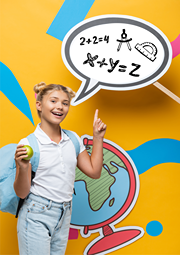10 Ways to Keep Kids’ Math Skills Sharp When School’s Out
Poorer exam scores, weaker self-confidence, and a lesser likelihood of high school and college achievement are long-term implications of learning loss. Fortunately, improving specific learning skills only requires a few months of subject-specific study.
Building strong math foundations is elementary school years right up through high school is strengthened when we make math part of everyday life. Here are some ways to incorporate math into a child’s life!
Make Math Delightful!
When children are not overburdened with responsibilities, especially when it comes to classes, homework, extracurricular activities, and so on, they have more time, are less exhausted, and can concentrate better. Select activities that will appeal to both you and your child, and have fun creating memories that you will treasure.
1. Mathematics should be included in the cooking process.
Following a recipe necessitates the use of concepts such as sequencing and counting.
Baking requires precise measurements. Therefore scaling a recipe requires division or multiplication.
You can start with a super easy recipe for shakes and smoothies. Then, once your youngster has mastered following a recipe, double it to test their proportional thinking.
2. Play games that need you to utilize your math skills to improve your arithmetic abilities.
Math-based games include Monopoly, Solitaire, Blackjack, Scrabble, Chess, Blokus, and any board or card game that uses money, keeps score or requires strategy. When traveling, there are numerous entertaining games to play. Games can assist your child in improving their mathematical fluency, logic, and probability skills. It’s also a terrific way to spend time with family and friends.
3. Go on a shopping spree.
Solicit your child’s assistance in locating sales, comparing prices, and calculating a range of things. First, bring your coupons and have them calculate how much you’ll save. Next, go to a farmers market for a pleasant, healthful, math-focused exercise. Then, you can give your child some cash and analyze what they do with it.
4. Visit a science center or museum on a field trip.
A visit to a neighboring science center or museum can be entertaining and informative for you and your youngster. Learn about inventors and innovators, participate in hands-on activities and interactive exhibitions, and improve your mathematical reasoning skills. It’s a perfect setting for your child to pursue a career in science.
5. Do some math while watching sports.
Make math a part of the experience when watching sports with your family or watching a soccer game. Encourage your youngster to collect statistics on their favorite baseball team or player, such as how long it takes for each goal to be scored. Football players can be compared based on touchdowns, yards, and tackles. Your child is capable of taking measures. Comparing them to a regulation-sized court is a good idea.
6. Put on some background music.
At it’s core, music is mathematical. There is a mathematical structure to the patterns you recognize in your favorite tunes.
7. Read math-related books.
One of the advantages of summer is having more time to read. In addition, when math is woven into the story, your child will benefit from being able to think quantitatively.
8. Start your own business.
Summer is the best season to make some additional money for spending. Ask your child to have some business idea or start a new venture with him. It’s a great approach to learn about accounting, costing, and profit management. Try to keep your math skills up by doing math in your head while possible and not always relying on calculators.
9. DIY (do-it-yourself) group!
Your youngster is practicing arithmetic while they work on a home repair project. Working with numbers, spatial thinking, measures, angles, calculating area, and problem-solving, depending on the topic, is a fantastic method for you and your partner to collaborate toward a common goal.
10. Enroll in a math curriculum appropriate for you, such as IB Mathematics.
IB Mathematics is an easy-to-use resource for IBDP math students and teachers. It offers fascinating scenarios in which students must take real-world problems and model them using appropriate mathematical skills that are taught throughout the process of navigating these situations to aid students in meeting the particular mathematics challenges.




